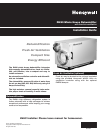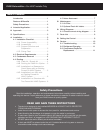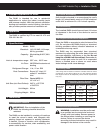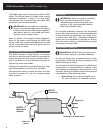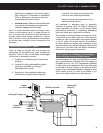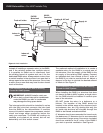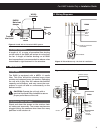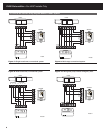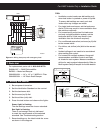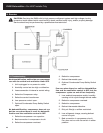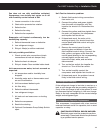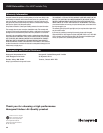
For HVAC Installer Only • Installation Guide
11
Fan does not run with ventilation activated.
Compressor runs briefly but cycles on & off
with humidity control turned to ON.
1. Loose connection in fan circuit.
2. Obstruction prevents fan rotation.
3. Defective fan.
4. Defective fan relay.
5. Defective fan capacitor.
Evaporator coil frosted continuously, low de-
humidifying capacity.
1. Defrost thermostat loose or defective.
2. Low refrigerant charge.
3. Dirty air filter(s) or airflow restricted.
Unit not providing ventilation.
1. Check control wire connections (check
connections at fresh air damper also).
2. Defective fresh air damper.
3. Dirty air intake. Clean outside intake hood.
Unit removes some water, but not as much as
expected.
1. Air temperature and/or humidity have
dropped.
2. Humidity meter and or thermometer used
are out of calibration.
3. Unit has entered defrost cycle.
4. Air filter dirty.
5. Defective defrost thermostat.
6. Low refrigerant charge.
7. Air leak such as loose cover or ducting
leaks.
8. Defective compressor.
9. Restrictive ducting.
10. Optional Condensate Pump Safety Switch
open.
Unit Test to determine problem:
1. Detach field control wiring connections
from main unit.
2. Connect the yellow and green pigtails
from the main unit together; only the
impeller fan should run. Disconnect the
wires.
3. Connect the yellow and blue pigtails from
the main unit together; the compressor
and impeller fan should run.
4. If these tests work, the main unit is
working properly. You should check the
control panel and field control wiring for
problems next.
5. Remove the control panel from the
mounting box and detach it from the
field installed control wiring. Connect the
blue, yellow, and green wires from the
control panel directly to the corresponding
colored pigtails on the main unit.
Leave the violet, white, and red wires
disconnected!
6. Turn on the fan switch; the impeller fan
should run. Turn off the fan switch.
7. Turn on the humidity control; the
compressor and impeller fan should run.
8. If these tests work, the problem is most
likely in the field control wiring.
9.2 Refrigerant Charging
If the refrigerant charge is lost due to service or a
leak, a new charge must be accurately weighed in.
If any of the old charge is left in the system, it must
be recovered before weighing in the new charge.
Refer to the unit nameplate for the correct charge
weight and refrigerant type.
9.3 Compressor/Capacitor Replacement
This compressor is equipped with a two terminal
external overload and a run capacitor, but no start
capacitor or relay.
CAUTION-ELECTRICAL SHOCK HAZARD:
Electrical power must be present to perform
some tests. These tests should be performed
by a qualified service person.



